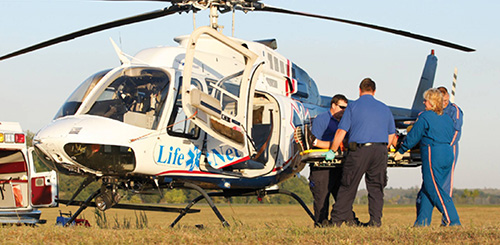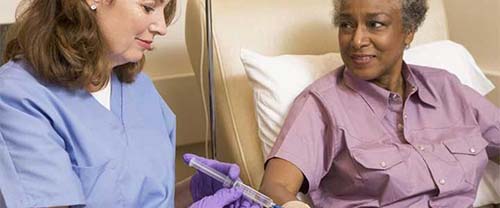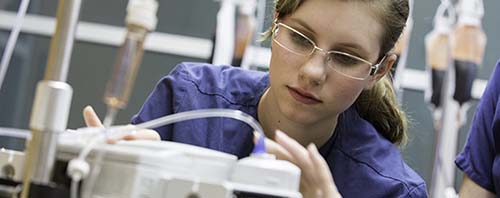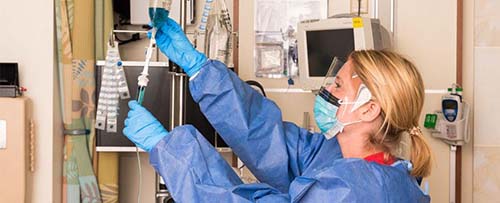When it comes to a career in nursing there are so many options to choose from. It can be difficult to wrap your head around the different avenues available to you. You can divide nursing into categories like education level, specialty, work environment, and so on. The thing to remember is the fact that nursing as a profession is pretty wide open because of a nationwide shortage of qualified professionals. If you’re interested in pursuing a nursing career you will have no trouble finding work once you graduate and earn your license.
For the purposes of helping you understand the many different types of nurses, we’ll discuss a little bit about education levels and then move into different work environments. For the most part, it’s the work environment that determines a nurse’s career path. Once you find the work environment you enjoy you can always further your education if it’s required for career advancement.
Education Levels
There are four basic categories of nurses in terms of education level:
- licensed vocational nurse (LVN)
- registered nurse (RN)
- registered nurse with a bachelor of science degree (BSN)
- nurse practitioner (NP)
The licensed vocational nurse is the entry-level nurse whose education puts her above a certified nursing assistant (CNA) but below a registered nurse. The LVN typically will earn an associate degree in a two-year program at a community college or nursing school. There are also many LVN programs that offer 12 to 16 month certification courses. Once in the profession, the LVN can provide all the basic level care to patients like bathing and grooming, checking vital signs, and administering some medications. More complex tasks will be off-limits to the LVN. Because vocational nurses don’t have as much training as a registered nurse, the LVN salary is significantly lower than RNs.
The registered nurse might also have an associate degree but will have taken extra courses and learned additional skills. Sometimes the registered nurse has a four year degree as well. The registered nurse is capable of almost all nursing tasks at the clinical level. She is more apt to work in a large hospital or commercial environment than a nursing home or private practice office.
The registered nurse with the Bachelor of Science degree (BSN) definitely has a four year degree and is prepared to be a floor nurse as well as a supervisor. He or she has added responsibilities no matter the work environment.
Finally, the nurse practitioner is a registered nurse with several years of additional education allowing him or her to perform many of the same tasks as a physician. Nurse practitioners often work in private practice offices as assistants to physicians as a means of making the caseload more manageable. Nurse practitioners can diagnose patients, prescribe medications, and layout a treatment plan in most cases.
Emergency Room Nurse

The nursing field has evolved to include a variety of different kinds of nurses. A sense of fulfillment, multiple opportunities, and strong salaries are worthwhile benefits for RNs or registered nurses. The continually growing demand for nurses has provided unique fields of specialty for RNs. One of these is the ER Nurse.
Multitasking, quick thinking, and decision-making are the topmost qualities for a person to be considered as an Emergency Room or ER nurse. The emergency room setting is different every day and an ER nurse should have the aptitude, training, adaptability, and willingness to cope with what each day brings.
The nurses that are best suited for this particular role are the ones that are ready to face the fast-paced challenges each case coming through the door brings. The familiar and unfamiliar cases coming in are met with the same determination, stamina, and fortitude by an ER nurse. This is because helping patients is his or her top priority while remaining steadfast in the presence of emotional patients in trauma.
Patients requiring urgent treatment due to severe medical conditions, trauma or injury are the ones treated by ER nurses. The crisis situations these specialists find themselves in calls for them to identify quickly the best way to minimize pain and stabilize patients.
It’s not all excitement all the time in the emergency room, contrary to what TV dramas show. A former transport and trauma nurse states that it may take a month or two for emergency rooms to receive unusual and interesting cases. ER nurses can, depending on the hospital, spend more time attending to other duties such as updating electronic health records and preparing rooms.
Working in an ER in large cities is more likely to bring about serious medical cases for ER nurses to work on. The medical cases can range from stab or gunshot wounds. But, altogether, primary care is the foremost reason for ER visits. READ MORE ABOUT BEING AN EMERGENCY ROOM NURSE
Flight Nurse

Decades ago the existing misconception about nurses was all about bedpans and sponge baths. That thinking has changed today as the public became more educated about the important role nurses have in the medical field.
What is a Flight Nurse?
For patients, the greatest advocate is the nurse. The time spent by nurses with patients also makes them comprehensive with assessing red flags and the effectiveness of the treatments.
The age of specialization has also made nurses evolve. While there are still general care nurses, specialization fields have further advanced the nursing career. One of these is the Flight or Transport Nurse.
The difference between life and death is often the time involved in transferring a patient from point A to point B. This kind of scenario has opened air transport as the way for transferring critically injured or oil patients quickly to trauma centers and many medical facilities.
While in transit, it is critical that patients are stabilized for them to arrive safely to their destinations. This means that medical professionals have to be on board. The expected medical team on board other than paramedics may sometimes include physicians. Yet, typically, paramedics and flight nurses trained to perform emergency medical care are the medical personnel on board.
Flight nurses are expected to be able to make quick decisions, work in an atypical environment for healthcare, and handle high-stress situations. These types of nurses have the option to work either for the military or the civilian sector. More freedom to work where they want to work is with the civilian flight nurses.
While the salary bracket and benefits are impressive with civilian flight nurses, it won’t match the earnings to that of a military flight nurse. However, extracting soldiers and patients severely wounded in war-torn areas are the job hazards faced by military flight nurses.
Simply put, registered nurses have the career option to become flight nurses. It is another rewarding field for nurses that want to render pre-hospital patient care during rescue operations onboard a helicopter, jet aircraft or propeller aircraft. READ MORE ABOUT BEING A FLIGHT NURSE
Psychiatric/Mental Health Nurse
Psychiatric (mental health) nurses care for a diverse mix of patients who have both psychiatric and medical illnesses. You may treat patients with neuro/memory problems, schizophrenia, drug abuse, eating disorders, geriatrics or chronic pain ailments. Patients may need long term care in the hospital or require outpatient day treatments. Working with other nurses, aides, physicians, psychiatrists, administrators and family you will provide medical care and education to the patient and their family.
Psychiatric nurses can work in a variety of settings including: hospitals, mental health hospitals, physicians’ offices, specialty treatment centers and/or university/schools. The option to choose your work schedule varies depending on the setting.
Private Practice or Office Nurses
Quite often the nurses we interact with on a regular basis are those who work in the private practice doctor’s office. These are the friendly and helpful ladies who greet us as we come in, measure our height and weight, check our blood pressure, and inquire as to the reason for the visit. They also take specimens, give vaccinations, and help the doctor with in-office procedures. Depending on the size of the practice the office nurse may also be involved in handling paperwork and office administrative duties.
Oncology Nurse

What is an Oncology Nurse?
The early days of cancer treatment is very different from what is happening today. The field of oncology now has better pain control, reduced treatment side effects, and more treatment options. The continually evolving science is dynamic with many new therapies in the future.
From cancer patient to cancer survivor is the current transition with many people. This means that living with the disease or often hoping for complete recovery is the scenario today.
The cancer care continuum involves numerous members of the medical community. One of the important roles is played by oncology nurses.
Oncology nurses supervise and provide care for chronically or critically ill cancer patients. They formulate strategies for symptom management, monitor physical conditions of their patients, and prescribe medication.
Often, oncology nurses develop a bond with their patients even when they also witness death and suffering.
The three important roles oncology nurses often play in cancer patient care includes:
1. Closely Bonding with their Patients
Lasting bonds are often formed between oncology nurses and their patients that continue even after the last treatment. The compassionate role played by oncology nurses as they guide patients through biopsy, coaching lessons through difficult procedures, and taking the time to explain the treatment’s side effects are always remembered by their patients. They are top advocates for their patients by providing comfort through bad times and celebrating the victories as well. Communication between caregivers and the medical team is often facilitated by oncology nurses.
2. Coordinate Cancer Care
Treatment protocols for cancer are often complex with corresponding side effects. A patient’s essential partner to navigate through all these as well as managing symptoms rest with oncology nurses. The various medical specializations coming from different professionals are often the phases weaved through by cancer patients. Guiding through the treatment plan and providing consistent information is often handled by an oncology nurse. The training undergone by oncology nurses gives them the ability to:
- Anticipate the needs of family caregivers and patients
- Assess patients’ needs in both outpatient and hospital practices
- Ensure adequate support for patients by working with social workers and case managers
- Ensure patients have professional help in their communities and homes
3. Patient Advocate
Oncology nurses are the patient’s number one advocate in the hospital setting. They are always there to offer compassionate care in all phases of treatment a patient undergoes. The types of nurses who specialize in assisting people with cancer are able to deal with the unique needs of patients with chronic medical issues. READ MORE ABOUT BEING AN ONCOLOGY NURSE
Dialysis Nurse

Information About Dialysis Nursing
Waste and toxins from our blood are filtered by the body’s organ known as the kidney. Not being able to do so can be devastating for a person having improperly functioning or unhealthy kidneys. The causes and treatment associated with kidneys are studied by a branch of medicine known as Nephrology.
The health of the kidneys is affected by several factors. It can be an acquired or genetic disease. It can be a chronic or acute medical problem. It can be life-threatening and debilitating.
The alarming rise of kidney health problems has made dialysis nursing one of the most rewarding career paths for nurses today. The specialized field of dialysis nursing has become promising with the projected job growth of 19% by the year 2022.
The numerous misconceptions about dialysis nursing in past years were the foremost reasons for registered nurses to avoid this career path. However, a rewarding career is in store for nurses specializing in dialysis or nephrology.
What is a Dialysis Nurse?
Nurses specializing in dialysis are either (APRN) advanced practice nurses or (RN) registered nurses. Assessing, diagnosing, educating, and treating people at risk or have developed kidney related problems are the crucial roles played by a dialysis nurse.
Dialysis helps patients with malfunctioning kidneys to do the work their kidneys are not capable of doing. This life-prolonging procedure administered by a dialysis nurse offers a new lease on life for ailing patients.
Nephrology Nursing is a large specialty field in which dialysis nurses are a subspecialty. A patient’s medical history and careful examination is the first line of assessment performed by a dialysis nurse.
Dialysis nurses are skilled medical professionals trained to handle patients with chronic and acute kidney diseases. Staying updated on the latest developments in this particular specialty is one of the important traits of a dialysis nurse.
The constantly evolving field of nephrology means dialysis nurses have to stay on top by attending seminars and conferences and reading niche medical journals for them to offer a high degree of service to their patients and employers as well.
What does a Dialysis Nurse Do?
A patient’s home, hospital or a freestanding clinic can be used as places to administer dialysis treatment. Any of these settings will work perfectly for dialysis nurses with regular working hours compared to other nursing specialties. The regular working schedule is mainly due to the typical and regular daytime treatment schedules of patients needing dialysis.
However, emergency rooms in hospitals often call upon nurses at any time of the day or night to perform dialysis. This type of service provides a nurse not only a chance to save a life but increased pay as well.
The typical duties of a dialysis nurse are to provide support, administer medication, and closely monitor the condition of the patient throughout his/her dialysis session. Health education is also part of patient care. Patients with acute or chronic kidney issues should be educated on their disease and coping mechanisms such as lifestyle choices to manage their disease.
Kidney diseases are often indirectly exacerbated or brought on by other health issues. A dialysis nurse must be familiar with these diseases for they may be required to treat them as well. Some of the health issues could include hypertension, substance abuse, and diabetes. READ MORE ABOUT BEING A DIALYSIS NURSE
Pediatric Nurse

A nurse who specializes in pediatrics will devote their skills and knowledge to caring for infants and children. These types of nurses will usually be required to have specialized pediatric training and will work closely with pediatricians and other nurses who specialize in children’s health.
The pediatric nurse salary will depend on the RN’s place of employment, their work experience and any additional training and certifications they may have. The salary for this field can also vary depending on location.
Job Description and Training Information
Like other RNs, the pediatric nurse can perform patient exams, take urine and blood samples, take a patient’s vital signs and perform other types of diagnostic tests. An RN with advanced pediatric training may also develop courses of treatment and interpret test results.
While pediatric nurses will care for children with illnesses and injuries, they will also dedicate quite a bit of time focused on training families on patient care and how to protect a child’s health. They will also create home care plans for special needs patients.

Health education and preventative care is a large part of the pediatric nurse career. Pediatric nursing is often described as being a calling, as opposed to being just a job. Pediatric nursing will provide you with the chance to play a key role in a young patient’s life.
A pediatric RN will work in a private practice, surgical center, hospital, clinic or other type of healthcare setting. This type of nurse can also work in local elementary, middle, and high schools. They may also work for organizations or community groups.
In many cases, the pediatric nurse will work closely with physicians who also specialize in family or pediatric medicine. The duties for the pediatric nurse are very similar to that of the standard duties required of other nurses; however, in this specialty area the nurse will typically interact much more closely with the child and their family.
Salary for the Pediatric Nurse Based on Experience and Location
According to statistics, the average pediatric nurse salary is around $76,000. As an RN in this field, you can expect the pediatric nurse salary to increase with experience. The hourly salary for RNs with less than one year of experience ranges from $33 to $40. RNs with ten to nineteen years have an hourly rate of twenty-two to thirty-nine an hour.
Surgical and general medical hospitals employ the most pediatric nurses. In these types of medical facilities the average annual salary ranges from $70,000 to $83,000.
Pediatric nurses who work for home healthcare facilities make an average of $74,000, while RNs who work in nursing care facilities will experience an average annual salary of $82,000. Outpatient care centers will pay an average pediatric nurse salary of $70,000.
Location is another factor that will have a big impact on this nursing salary. Statistics show that salaries for this position were generally higher in the Northeast and on the West coast.
The five states that currently offer the top paying annual salaries include Oregon, Alaska, Massachusetts, Hawaii and California. States that offer the lowest salary include Iowa, West Virginia, Alabama, Kansas, Tennessee and North Dakota. In these low paying states nurses average $43,000 to $64,000 a year.
Pay is Typically Higher with Specialized Certification
The salary for this career field is also determined by the nurse’s level of education. RNs with the CPN credential have an hourly wage of $42 to $51. Nurses with the RN certification with have an hourly wage that ranges from $36 to 48.
All healthcare professionals in the nursing field will begin their career by becoming an RN. Training that’s specific to child care is required for this position. The training will involve a mixture of clinical work and formal education.
Becoming an RN is the first step towards pursuing a career in the specialized field. A student can enroll in the two year associates or four year bachelor’s degree program in nursing. Some diploma programs that are offered through teaching hospitals can also prepare a student for the registered nursing exam.
Licensure and Advancement Information for Pediatric Nurses
Every state requires a nurse to be officially licensed, which involves passing the NCLEX-RN exam. Some states can have additional licensing requirements. The pediatric nurse will also be required to pass the CPN exam in order to obtain certification. The registered nurse will need to have a minimum of eighteen-thousand hours of pediatric clinical work in order to be eligible for certification.
There are a number of seminars and workshops available to professional pediatric nurses. These seminars and workshops are available at health organizations and local colleges. They will address a number of topics such as alternative therapies in pediatric medicine and genetic research. All RNs will be required to participate in continuing education practices in order to qualify for licensure renewal.

The pediatric RN who wishes to advance in this field can choose to become a pediatric nurse practitioner. The completion of a master’s degree and additional licensure will be required for this position.
Pediatric Oncology Nurse

What is Pediatric Oncology Nursing?
Pediatric oncology nursing is a challenging specialty in the field of nursing that combines a love for children and the opportunity to be involved in scientific advances in the treatment of cancer. A career in pediatric oncology nursing is both challenging and rewarding.
What Does a Pediatric Oncology Nurse Do?
Pediatric oncology nursing involves providing care for children who have a variety of cancer diagnoses. This includes administering chemotherapy or other treatments under the supervision of an oncologist, but there are other duties that are just as essential.
The nurse is also a part of the support system for the family of the child who is undergoing treatment by explaining treatment plans. He or she must assess the physical and psychological needs of patients and help to treat these, as well.
How to Become a Certified Pediatric Oncology Nurse
Pediatric oncology nursing is a specialty within the field of oncology that involves providing care to children with cancer. The minimum requirement for becoming a pediatric oncology nurse is having a nursing degree and passing a licensing exam. However, there is also a certification program that formally recognizes the special knowledge and skill that pediatric oncology nurses have.
Room for Advancement
Clinical nurses in pediatric oncology nursing provide day-to-day care for pediatric patients, including administering treatments and providing education to children and their families.
There are several routes for moving into new areas of the profession. Case manager nurses coordinate with the patient’s physician team and monitor care. Some nurses may work as clinical educators. In addition, research nurses work on coming up with new treatments in collaboration with a research team.
Pediatric Oncology Nurse Practitioners
There are nurse practitioners in pediatric oncology nursing, as well. Because nurse practitioners have more extensive education than registered nurses, often including graduate degrees, they have a broader range of duties. These include day-to-day treatment and monitoring of patients.
They may also work in coordinating patient care or in conducting research. NPs may order tests and medications as well as administer them. They may also work in patient advocacy and make recommendations on pain and symptom management and end-of-life issues.
Education and Training
To get a job in pediatric oncology nursing, you will need to become a registered nurse (RN). This involves completing an accredited nursing program. These may be found in universities, hospitals, and community colleges nationwide.
Nursing programs require internships and/or residency programs in addition to course work. After completing the program, nurses must pass the NCLEX-RN exam and be licensed. The nursing license requires periodic renewal via continuing education coursework. A pediatric oncology nursing certification may also be required.
Salaries and Work Settings

A career in pediatric oncology nursing may pay anywhere from $63,000 to $107,000 a year. Nurses with more experience and higher education earn more than those right out of nursing school. The setting in which a nurse works also will have an impact on salary.
Working in a private practice may mean a higher starting salary, for instance. Other settings a pediatric oncology nurse might work in include public heath communities, both public and private hospitals, and sometimes even a pharmaceutical company.
Pediatric oncology nursing is a challenging field. Successful nurses will combine superior clinical knowledge with a desire to help children and their families as they go through a very difficult experience.
Why Get Certified?

Becoming a certified pediatric oncology nurse is voluntary. However, it can be a good move for a variety of reasons. First, pursuing a certification shows that a nurse is up to date on the current professional practices in the field. This increases their credibility with patients and families because it shows that the nurse’s knowledge is up-to-date.
Keeping up with the certification also requires that the nurse do continual professional development, which ensures that they are on top of new developments.
Job Benefits to Certification
There are career benefits to being a certified pediatric oncology nurse, as well. Certification may be required to advance to higher positions. There may also be financial incentives, like increases in salary or bonuses.
Certified nurses may make up to $10,000 more a year than uncertified nurses. Nurses who are certified are also in more demand than those that are uncertified, because the certification demonstrates that they are high-quality professionals that are serious about their work.
Nurses at all levels are in increasingly high demand in today’s workplace. Becoming a certified pediatric oncology nurse will help to pave the way to career success and advancement.
Perinatal Nurse / Maternity Nurse
Perinatal means the time before or after birth. A Perinatal nurse works with childbearing women and their families to support them with skills to care for themselves and their families as they prepare for birth and after. As a Perinatal nurse, you work as part of interdisciplinary team that can include obstetricians/gynecologists, midwives, doulas, physiotherapists and other providers. You likely will work in labor and delivery (L&D) in the hospital to support women and their families during birth and postpartum.
Like other types of nurses, perinatal nursing requires that you help provide education and support to ensure the health of both the mother and child. As perinatal nurse you may help monitor changes in the woman during pregnancy, estimate gestational age of the baby, monitor lab values for abnormalities that may indicate the need for monitoring and of course assist in the delivery of the baby. A perinatal nurse must be able to work in a dynamic environment with a great deal of sensitivity and excellent communication skills.
In the community, care can include working as a lactation consultation to advise new mothers on breastfeeding. Other avenues could include following up with families after birth to ensure the baby is feeding well, up to date on immunizations and the mother doing well. Maternity nurses can also help screen for things like postpartum depression.
Some states may require additional certification to work in this area including Pediatric Advanced Life Support (PALS). Many states require perinatal nurses in the hospital to be registered nurses.
For further education, you can become a Certified Nurse Midwife (CNM). A CNM is a midwife with a masters degree who is trained to support women in their pregnancy and in labor/delivery. They cannot do surgery on patients, so if a cesarean section is needed or a vacuum or forceps assisted birth, a physician must help them.
Some nurses also consider adding training as a doula to their skillset. A Doula is a birth companion or coach pre and postpartum. Typically, they are a certified non-medical person who assists a woman with birthing and provides both physical and emotion support.
Cardiac Care Nurse
Cardiac nursing is one of the more common specialties. in nursing Cardiac Care Nurses (CCN) can work in a variety of settings with patients cardiac or heart problems. It is common for CCNs to work in intensive care units in hospitals, in cardiac care units or even cardiac rehabilitation units.
A cardiac nurse must have a good knowledge of anatomy and physiology and a working knowledge of cardiac issues and treatments. You will have knowledge of chronic and acute cardiac issues and the interventions that patients may receive like coronary artery bypass surgery or pacemakers. You will likely need to have current Basic and Cardiac Life Support certification and have to earn a Cardiovascular Nurse Certification through the American Nurses Credentialing Center.
CCNs gain special training related to the heart and supporting systems. They learn skills like how to perform electrocardiograms, graded exercise tests to assess the cardiac output of the patient and other types of monitoring. In this specialty you may also work closely with a cardiologist, a dietitian, a physiotherapists or even occupational therapist to help cardiac patient’s recovery after cardiac surgery, heart attacks or to live successfully with chronic illness such as congestive heart disease. You will become skilled at addressing the complex physical symptoms, nutritional and emotional needs of a patient if you were to pursue this as one of your specialties in nursing.
Legal Nurse Consultant
Legal nurse consultants take on a variety of roles to bring their nursing expertise to legal matters. The most common role is reviewing medical records for an attorney to help them decide whether professional negligence occurred in a given case. Disability or Workers’ Compensation cases may require a similar review.
You might help the attorney prepare for a deposition of the plaintiff or the physician, perhaps by familiarizing them with medical or nursing terminology. As a legal nurse consultant you can testify as an expert witness at a trial.
The base requirement for being a legal nurse consultant is that you have extensive experience in the practice of nursing. On top of that, it helps to have some type of relevant experience in the legal system.
A graduate degree and certification in the nurse legal consultant clinical specialty both help establish credibility. Related legal opportunities for nurses include the role of Nurse Risk Manager, and Nurse Attorney.
Administration Nurses
Administrative nursing gives you the opportunity to provide quality health care management behind the scenes in lieu of the hands-on interaction with the patient. There are several avenues that this nursing specialty offers.
Nurse Administrator/Nurse Manager
Nurse Administrators/Nurse Managers have a main goal of assisting relevant healthcare and medical facilities in the delivery of optimal patient care. These types of nurses achieve their goals by ensuring proper staffing ratios, overseeing the facility budget, managing the needed supplies, and implementing required patient care guidelines. Nurse Administrators/Nurse Managers may work in many different healthcare and administrative settings. Those settings include healthcare agencies, assisted living facilities, hospitals, and outpatient clinics.
Health Care Administrator
The Health Care Administrator focuses on the design and management of efficient health care delivery systems. These systems are complex and require advanced decision-making skills. Comprehensive knowledge is often required in the fields of professional development, organizational design, strategic planning, health care access/utilization, health policy, marketing, information systems, continuous quality improvement, and total quality management.
Case Management Nurse/Insurance
The Nurse Case Manager works to ensure that quality health care is being delivered in an efficient, cost-effective manner to individual patients as they move from setting to setting within the health care system. A Nurse Case Manager usually specializes in managing of care to a specific group, such as adults, families, children, the elderly, AIDS patients, patients with cardiovascular disease, etc.
Hospital and Clinic Nurses
Public health clinics and hospitals employ an entire army of nurses to handle the many varied types of patient care necessary. These positions are oftentimes more demanding than that of the office nurse simply because of the larger volume of patients and the wider range of medical problems. In a public clinic setting the duties of the nurse are very similar to that of a private practice nurse except on a larger scale. The one exception is that the clinical nurse probably won’t be performing office duties.
In a hospital setting the duties of the nurse are wholly dependent on the department she works in. For example, the emergency room nurse will be heavily engaged in first aid, trauma, and assisting doctors in life-and-death situations. On the other hand, the obstetrics nurse will concentrate on delivering mothers and their babies. They help in labor and delivery, infant care, and parent education. While not necessarily as stressful as working in the emergency room, the obstetrics department offers special challenges of its own.
Because the departments in a hospital are so numerous and different, it would be impossible to give details about each one. But rest assured there are specialized nurses in every department including pediatrics, oncology, radiology, immunology, cardiology, intensive care, and even hospice.
Assisted Living Nurses
Our next category of nurse is the one who works in the nursing home or assisted living facility. These nurses might have the most difficult job of all due to tight budgets, long hours, low pay, and patients who can be very difficult to deal with at times. More often than not the nurses working at such facilities are LVNs. Thankfully the vast majority of them are extremely professional and dedicated to providing quality care to their patients. Their typical duties include all facets of daily patient care under the supervision of a registered nurse.
Traveling Nurses
A relatively new phenomenon in the nursing industry is that of the traveling nurse. Because there is such a nationwide shortage it’s difficult for medical facilities to replace nurses who might be out for vacation, maternity leave, or some other purpose. Medical staffing agencies provide temporary nurses to fill those staffing needs so that medical facilities don’t have to worry about a replacement. The traveling nurse is in a unique position, if for no other reason than the ability to travel and see new places.
The traveling nurse industry needs professionals with all levels of education and specialty. Nurses will take temporary assignments lasting anywhere from 3 to 12 months before moving on to the next one. The pay is competitive when you take into account a staffing agency normally pays travel expenses and provides housing. Being a traveling nurse is a great way to see the country, or even the world if you like, while practicing a profession you love.
Home Health Nurses
An occupation similar to that of the traveling nurse, but on a local scale, is the home health nurse. The home health nurse provides routine daily care to a variety of patients who are home bound. This nurse typically works in concert with home health aides and CNAs to provide as much care as the individual patient needs. Some nurses prefer this type of work because of the freedom of being out of the office. At the same time the unpredictable nature of treating patients in their homes can make it a bit taxing.
Occupational Nurses
Occupational nurses are those who provide care in the non-medical workplace. For example, nurses at public schools and company first aid offices are considered occupational nurses. These nurses can be LVNs or RNs depending on the needs of the particular environment. They are there to perform first aid in the event that a worker or student is injured or falls ill. In some cases they might also offer counseling services to workers or students with health concerns.
We’ve given you just the tip of the iceberg in terms of the types of nurses and some of the things they do. Rest assured there’s a whole lot more to the nursing profession than what we’ve discussed here. For more information about nursing as a career consider talking to family and friends already in the profession, contacting one of the nursing programs close to you, or even visiting some nurses at your local hospital or doctor’s office. We also cover a whole lot more information on specific nursing types through this website.
Labor & Delivery Nurses
Being a labor and delivery nurse (L&D Nurse) is a rewarding profession, as it gives you the opportunity to help mothers as they bring new life into the world. Apart from being responsible for providing care for the mothers, these nurses are also responsible in providing care for babies. Almost all labor and delivery nurses work in hospitals. L&D nurses are just one of the many different types of nurses that receive specialized traing and certification.
If you’re interested in learning more about this profession, you’re probably wondering exactly what you need to know and do to obtain a job in an L&D unit. Before you can get hired in such a position, you have to complete a certain amount of schooling to specialize in this field. READ MORE ABOUT BEING A LABOR & DELIVERY NURSE
Forensic Nurse

Forensic nursing is a new specialty that merges the nursing field and the judicial system. It has become what it is today because of the needs that it fills. Thanks to forensic nurses, survivors of sexual violence don’t have to stay at the emergency room nearly as long.
What has made forensic nursing so popular is it’s convenience. Victims get tossed around from one professional to another, most times having to answer the same questions for each professional. Victims spend as much as eight hours in the emergency room.
Having one professional to handle all the duties of gathering forensic evidence quickly and effectively makes it a lot easier on the victim.
The appeal of forensic nursing is mainly with survivors of violence. Multiple people are seeing victims: social workers, doctors, the police etc. This can be hard on the victim. Having one expert that can do everything from start to finish including going to trial would make it a lot less stressful for the victim.
With the ever increasing rise in crime rates, forensic nursing is becoming more and more popular by the day. Nurses who specialize in this new field work to appropriately gather evidence from victims and perpetrators of violence. They are especially needed in the emergency room to quickly gather and package evidence.

They also offer the survivor of violence compassion about the situation they’re in and try to make the gathering of evidence as quick and painless as possible. They (forensic nurses) are very concerned with giving care to the survivor and making sure they’re as comfortable as possible.
To be a forensic nurse, you must be at least an RN and complete specialized training to meet the standards IAFN outlines for forensic nurses.
The nurses that are involved with forensic nursing say that it’s hard work, but very rewarding. Some of these nurses have been victims of sexual assault themselves, so they have first hand experience. They take pride in the fact that they’re making a difference.READ MORE ABOUT BEING A FORENSIC NURSE
ICU Nursing
Working in an intensive care unit (ICU) can be a rollercoaster ride of unpredictable situations and delicate patient conditions, requiring nurses who enjoy the challenges that come along with patients in need of critical care.
Education Requirements for an ICU Nurse
Any registered nurse (RN) can work in a hospital’s ICU, which means they will have received a diploma, associate’s degree or bachelor’s degree from a nursing program and have passed the national licensing examination.
But, most ICU departments don’t accept entry-level nurses, although it’s been known to happen in the case of nurse shortages. This is because ICU patients require a higher level of monitoring and care than regular patients, and more experienced nurses are better equipped to handle the uncommon situations that arise in the ICU. Often, RNs need at least a year of nursing experience before transferring to the ICU.
In addition to simply working and gaining experience, there are other ways that RNs can get more education to specialize in critical care (ICU) nursing.
Continuing Education Units in Critical Care/ICU Nursing
Because health care is an ever-evolving field, all states require that RNs complete a certain number of continuing education units (CEUs) to keep their licenses current. One CEU is equivalent to 10 contact hours of study.
Nurses can typically choose to take CE courses in any specialty, including courses that relate to critical care. CEUs in critical care can position a RN for advancement into the ICU by showing specialized knowledge of acute care issues. All CE courses should be approved by the American Nurses Credentialing Center (ANCC).
The American Association of Critical Care Nurses (AACN) is an ANCC-accredited organization that offers a number of online CE courses in critical care. All courses are free to AACN members, and the number of contact hours for each course is clearly identified. Some AACN course titles include:
- Sedation in the ICU
- Critical Care Nursing Research Studies You Should Know About
- Acute Coronary Syndrome and Chest Pain
- Sound Intensity and Noise Evaluation in a Critical Care Unit
- Packed Red Blood Cell Transfusions in Critically Ill Patients
Graduate Degree Courses in Critical Care Nursing
For nurses who want to really step it up a notch, getting a master’s or doctorate degree in acute care nursing will demonstrate real commitment to this specialty.
Students interested in ICU care can enroll in a MSN program to become an Acute Care Nurse Practitioner (ACNP) or a clinical nurse specialist (CNS) with a specialty in critical care and trauma. Both programs qualify graduates as experts in the overall care of acutely ill patients and will prepare them to become Certified Critical Care Nurses (see below for more information).
ACNP Program Requirements – In addition to a BSN, some programs will require that students have a year of experience working in an acute care setting.
ACNP Coursework – There are three main areas that comprise the curriculum for master’s-level ACNP students:
- Core Orientation Courses – These include advanced theory and research classes that all graduate-level nursing students will take regardless of specialty. These courses typically have to do with research methods and advanced practice nursing theory.
- Core Clinical Courses – Courses include advanced pharmacology, pathophysiology and assessment courses that build upon what students have already learned in undergraduate courses and are often targeted toward the acute care specialty.
- Specialty Courses – These courses provide students with a strong foundation in advanced acute care. Students learn how to manage the care of critically ill patients as well as interpret test results.
Clinical hours are incorporated into specialty coursework, and a licensing exam is required as well as a culminating assessment, such as a thesis or other research project.
Becoming a Certified Critical Care Nurse (CCRN)
The American Association of Critical Care Nurses (AACN) offers an exam that will certify a RN with a specialty in critical care nursing. There are about a dozen subspecialties that focus on specific populations, but the general certification is for adult, pediatric and neonatal critical care (CCRN).
AACN certification isn’t a graduate-level degree program. It is a certification that a RN can earn that signifies expert knowledge in the area of critical care. This exam s often taken by nurses who have years of experience working in critical care or who have completed a graduate degree.
In order to take the CCRN exam, a nurse must work in critical care (an ICU or emergency room) for two years and must be prepared to renew the certification every three years with CEUs.
While graduate-level schooling provides the best training for this test, the AACN offers the following strategies to prepare for the CCRN exam:
- Study the test plan, exam references and sample exam questions found in the Certification Exam Handbook, an informational PDF that can be downloaded for free on the AACN web site.
- Purchase on online self-assessment exam for the CCRN, which has questions written by many of the same people who wrote the CCRN questions.
- Take or purchase an exam review course. A comprehensive list of courses is available on the AACN web site.
- Use colleagues as a resource. Nurses who have already achieved certification are a wealth of information. If several co-workers are preparing for the exam at the same time, consider forming a study group.
Geriatric Nurse
If you are considering a career in geriatric nursing, there are a few things to keep in mind. Do you have the right personality? As a general rule, geriatric nurses are cheerful and upbeat. Some common personality traits many geriatric nurses usually share are empathy, patience, compassion, and understanding. The field of geriatric nursing involves having a deep desire to work directly with patients who may be developing illnesses which are often associated with an aging population.
A career in the gerontology field can be personally rewarding and gratifying. But do keep this in mind: working with elderly and aging patients can be depressing, frustrating, and disheartening. Everyone is affected differently by the natural aging process. Many aging patients and clients are happy and content. Other aging patients may be angry, often upset, depressed, and/or down-right scared. They may be suffering from chronic illnesses, which often takes a toll on their physical and mental health. READ MORE ABOUT BEING A GERIATRIC NURSE
Nurse Practitioners
If you decide to become a nurse practitioner, you must first earn the BSN and also pass the NCLEX-RN exam for licensing. After that, nurse practitioner schooling requires that you complete your master’s degree program and then select the area of additional study where you will practice. There was a time when the NP was thought to be a substitute for a physician, but no more. Often times the NP works as an extension of a physician and there are times when they work together as a unit.
The NP today is recognized as a new way to offer a skilled approach to the nursing field. They are trained and authorized to interpret diagnostic and laboratory tests and can write prescriptions for medication and treatments under their own authority and merit.
In Nurse Practitioner programs today, you will find a number of available options for a career as an NP. Some of the choices are working in an acute care facility, treating adults only such as in geriatrics, community healthcare, home healthcare, family nursing, pediatrics or neonatal.
The primary degree that you must hold to become a nurse practitioner is the Master’s of Science degree in nursing. In the event that you have a Masters in some other field, the option for a post-masters certificate program might be for you.. The job outlook for nurses in general and nurse practitioners is very bright for the next 10 to 12 years as the nursing shortage continues. Salaries for Nurse Practitioners continue to rise commensurate with the added responsibility.READ MORE ABOUT NURSE PRACTITIONERS
Case Management Nurse/Insurance
The Nurse Case Manager works to ensure that quality health care is being delivered in an efficient, cost-effective manner to individual patients as they move from setting to setting within the health care system. A Nurse Case Manager usually specializes in managing of care to a specific group, such as adults, families, children, the elderly, AIDS patients, patients with cardiovascular disease, etc.
Critical Care Nurse
Critical care and intensive care nursing encompasses a range of nursing specialties that revolve around care for the critically ill. Cardiac nursing and pediatric critical care nursing are two examples. From heart attack and stroke, to severe respiratory insufficiency, from overwhelming infection, to burns and gunshot wounds, you work with a team of medical personnel to provide the highest quality care for all patients facing life-threatening conditions.
The environment in which you will work is usually under high pressure, requiring you to make crucial decisions very quickly. If you like to take risks, you are a leader, and you have the interest in continually learning about new research, medicines and procedures, this is a good field for you. Creating your own full-time, part-time or weekend schedule to accommodate your lifestyle is a possibility.
Nurse Educator
A Nurse Educator provides both new and advanced degree nurses with the knowledge, the skills and also the inspiration they need in order to deliver a consistently high level of patient care. Nurse Educators may serve as instructors for nursing programs at all levels; they may also lead staff development and community education programs, or serve as a consultant when guidelines for clinical practice, public health policy, or related guidelines and policies are being developed.
If you have a passion for teaching and a quest for continual learning this may be the appropriate career path for you. You will be creating the foundation of knowledge to which your students will refer during their entire career.
Indirectly, you provide the care and treatment to patients through your teachings. Since the demand for nurses is so great, there’s an excellent opportunity for developing a career in this field. Nursing programs are available part-time, full-time, day and evenings, weekends and on-line, so there’s flexibility as an educator, also.
Hospice Nurse
The hospice nurse offers a relatively new concept of delivering patient care. This specialized patient care has been designed to provide support and comfort to both the patient and the patient’s family. This approach is taken when the patient is no longer responding to treatments that are oriented towards a cure. One of the main goals of a hospice nurse is to maintain, and possibly improve, the comfort level of the patient during the patient’s final days. Pain management is a primary concern of hospice nurses, as is ensuring the patient is treated with dignity and respect.
The specialty of hospice nursing appeals to extremely compassionate individuals who work closely with family members, healthcare professionals, and members of the volunteer community. Hospice nurses must be keenly aware of the spiritual, social, financial, and emotional impact the terminal illness is having on the patient. The friends and family of the patient must also be kept in mind as nursing care is rendered.
In this field your schedule may not be as flexible when you are dealing with patients that are dying. You may be on-call and required to tend to the patient anytime, day or night.
Nurse Midwife
Certified Nurse Midwives (CNMs) have been educated in both midwifery and nursing care. These types of nurses perform gynecological exams, provide pre-natal, labor, delivery, after birth and care of the newborn, assistance with the many aspects of family planning, management of menopause, and professional counseling in general ob/gyn prevention of diseases, and proper health maintenance.
Some Nurse Midwives are employed by local hospitals, while others work with a physician or a group of physicians. To become a CNM, you must be a graduate of an educational program certified by the American College of Nurse Midwives, and you also need to pass a national examination for certification administered by the AC Certification Council. Massachusetts has one of the largest numbers of CNMs in the country.
TACC Certified Midwives (CMs) have a background in healthcare fields other than nursing, and have graduated from an ACNM-certified midwifery program, after which they must pass the same examination as a CNM.
Military Nurse
If you are patriotic and courageous, and show determination and leadership, the military is right for you. As a military nurse you may have the opportunity to experience more intense medical cases then traditionally seen in a hospital setting.
Working alongside medical and military staff and civilians you’ll provide medical care, support and education. The rewards of becoming a military nurse are many, and so are the challenges, forcing you to give a great amount of consideration in making your decision to join.
The opportunity to further your education or career path with minimum financial risk is one of the greatest benefits of becoming a nurse in the military. Your daily schedule will be determined without your input by senior members of the military, so you have to be willing to accept orders.
Neonatal Nurse
Neonatal nurses focus on the health care needs and well-being of newborns and their families. You will be among the first of health care professionals to provide medical treatment and care to newborns (both pre-mature infants and full term infants) and to educate their families. This is a great specialty if you have a passion for the challenge of treating a new life. READ MORE ABOUT BEING A NEONATAL NURSE
Advanced Practice Neonatal Nursing (APNN)
The Committee on Fetus and Newborn (COFN) has defined the role of the advanced practice neonatal nurse (APNN) as having completed a specialized educational program and supervised experience and having met nationally recognized standards. Neonatal nurse practitioners and neonatal clinical nurse specialists fall under the umbrella of APNNs.
Neonatal Nurse Practitioner (NNP)
A neonatal nurse practitioner is a registered nurse with the clinical expertise and formal training in neonatal nursing, who administers care to newborns and their families. Combining your experience and knowledge of pathophysiology, pharmacology and physiology, you’ll evaluate, diagnose and administer the medical treatment of infants. You may also be involved in education, consultation and research at various levels.
Neonatal Clinical Nurse Specialist (NCNS)
Neonatal clinical nurse specialists have undergone the same education and clinical training as a neonatal nurse practitioner but have gone on to get an advanced degree. Upon completion of your Master’s degree and supervised practice at the graduate level, you’ll be considered an expert in the theory and practice of neonatal nursing.
This expertise allows you to work independently as a consultant on research projects and data collection, setting standards for procedures and patient care within the unit or as an adviser to neonatal nurses, neonatal nurse practitioners, and other health care providers.
Public Health Nurse
As a public health nurse you’ll work with individuals, families and/or groups to promote the overall health of the community. You may educate others on issues ranging from disease prevention, communicable diseases, nutrition, prenatal care, childcare, to senior care. Typically a public health nurse provides immunization, blood pressure screening and other health screenings to the community they serve.
Public health nurses work in governmental or private agencies and clinics, schools, or community organizations. You may work independently or with community/school administrators or leaders.
Rehabilitation Nurse
Rehabilitation nursing is based on the philosophy that every individual, regardless of illness or disability, has the potential for a productive, dignified and personally meaningful life. Your goal is to increase the independence and function ability of a variety of patients ranging from spinal cord injuries, orthopedics, and oncology, to strokes and other serious medical complications.
You will be an integral and active part of a team that may include members from speech, physical therapy, occupational therapy, psychology, social work, nutrition and respiratory therapy as well as psychiatry.
As a rehabilitation nurse you’ll promote patient knowledge, participation, increased cognition, independence, and empowerment. Patience, determination, commitment are a few of the attributes needed to work in this field.
Research Nurse/Clinical Research Nurse
Research nursing, sometimes referred to as clinical research nursing, involves extensive clinical practice and basic research to establish a scientific basis for the care of patients, management of illness and recovery, reduction of risks for disease, promotion of healthy lifestyles and quality of life for those with chronic disease and care for the terminally ill. As a research nurse working in a laboratory or hospital setting you’ll be at the forefront of the advancement of medical procedures.
You may work autonomously or collaboratively in a variety of settings including, public and private institutions, governmental, state or military agencies or universities. If you have an investigative nature, attention to detail, and an analytical aptitude this is the nursing specialty for you.
School Nursing
The school setting provides you the opportunity to serve the heath care needs of the students, and indirectly, their families and the overall school community. Your role is to promote the well-being, academic achievement and life-long health habits of students. School nurses usually work independently to implement a school health program/curriculum but will also collaborate with faculty, administrators, community organizations and parents to execute those plans.
You’ll provide counseling, psychological and social services that promote healthy social and emotional development and remove barriers to students’ learning. Responsibilities may include nursing, administering or monitoring medication and other health services that students need to stay in school, nutrition planning through the cafeteria program; consulting with the physical education staff, and advising on health education taught by teachers.
This specialty is ideally suited to the individual who loves to work with children yet enjoys the administrative, research and planning part of nursing as well.
Guide To Family Nurse Practitioners
According to the Kaiser Family Foundation summary in 2013, one of the primary aims of current health care legislation is to develop an improved healthcare workforce. The report indicates that funding has been set aside for the specific purpose of training and employing family nurse practitioners.
Based on the 2010 Patient Protection and Affordable Care Act, funding is being provided to attract, teach, and keep nurses; as well as, provision of loan repayment options with employment retention grants when an advanced nursing degree is completed. The main aim of this type of grant funding is to increase the amount of family nurses practicing primary care in federally funded and nurse-managed clinics and healthcare centers.
The implications of this grant funding are unmistakably for those professionals looking to attain their family nurse practitioners or FNP qualification. Not only will the national healthcare look to provide a form of financial support for the FNP students, but also increase job placement.
This is a good time to explore the options for attaining an advanced practice registered nursing qualification as a family nurse practitioner. Furthermore, family nurse practitioners have various alternatives to find the program that works for their needs.
In this post, we’l discuss the various academic options available for FNP nursing qualifications. By compiling a list of the schools, you will save time and energy searching for the most suitable alternative.
This article highlights some of the more popular nursing schools providing information on the programs selected by prospective nursing students. Below are some of the program details, many of which offer online learning options allowing you to learn from your own location. The article also points out information on choosing the correct FNP program to meet your specific needs. READ MORE ABOUT BEING A FAMILY NURSE PRACTITIONER

